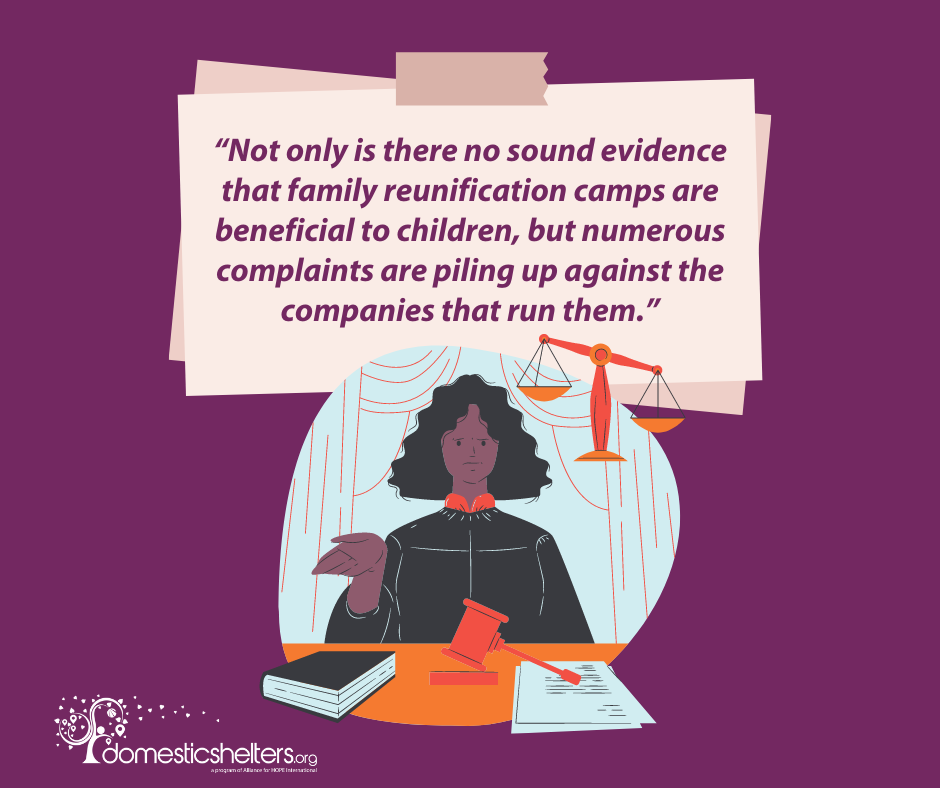1. Select a discrete app icon.

notes
Can States Protect Kids from Reunification Camps?
What lawmakers can learn from the legislation passed in these six states
- Jun 12, 2024

In case you missed it, this past February we covered the horrors of family reunification camps, for-profit programs purportedly designed to help parents reestablish a relationship with the children they’ve been “alienated” from by the other parent, usually through divorce. One such camp, Building Family Bridges, markets itself as an “innovative four-day workshop” that “helps children reunify with a parent they claim to hate or fear.”
Of course, the children who claim to hate or fear a parent often have a good reason: In many cases, it’s because that parent is abusive either to them or to their other parent. And these camps even go so far as kidnapping children in the middle of the night and holding them captive with the abusive parent until the children acquiesce to having a relationship with them—or at least convincingly pretend to do so.
Not only is there no sound evidence that family reunification camps are beneficial to children, but numerous complaints are piling up against the companies that run them. Children have endured abuse and even died after being forced to spend time with an abusive parent, even for a short period of visitation. Luckily, new laws are trying to put a stop to these so-called “camps.”

Court-Ordered Abuse?
How is this legal? Not only is it legal, but family courts actually order children to attend these camps in misguided efforts to overcome “parental alienation syndrome,” a debunked psychological “disorder” that develops when a child is manipulated by one parent into turning against the other. Abusive parents often claim they suffer from parental alienation syndrome (PAS) during custody battles in order to win full custody of children, be awarded more time with the kids and even convince judges to impose stay-away orders against the survivor, preventing him or her from seeing the children at all. These tactics are another way abusers exert control over survivors; it’s called post-separation legal abuse. But here’s the thing: The syndrome doesn’t exist.
As stated on the American Psychological Association website: “[PAS] has been dismissed by the American Psychiatric Association, American Psychological Association, and American Medical Association as lacking supporting empirical or clinical evidence and it is not included in the Diagnostic and Statistical Manual of Mental Disorders or the International Classification of Diseases.”
States Are Taking Notice
Fortunately, legislators in some states are getting wise to the PAS myth and the sham that is family reunification camps thanks largely to the Keeping Children Safe From Family Violence Act, also known as Kayden’s Law. Kayden’s Law was added to the federal Violence Against Women Act to incentivize states to adopt legislation designed to protect children from harmful family court practices, including ordering children to attend reunification camps.
Thus far, lawmakers in Arizona, California, Colorado, Pennsylvania and Utah have successfully passed legislation based on Kayden’s Law. Each state’s legislation has its own wording and nuances. The California bill, dubbed Piqui’s Law after a 5-year-old boy who was murdered at the hands of his abusive father during a custody battle, bans forcibly sending kids to reunification camps and requires that family court judges complete training on how to better assess whether or not a parent is a danger to their child. The Arizona bill, which will take effect after the 2024 state legislature adjourns, will ban Arizona family court judges from sending Arizona kids to family reunification camps unless both parents consent. The Colorado law also requires court experts to undergo training on domestic violence and child abuse.
Abrial’s Law passed in Tennessee in 2024. Although it doesn’t outright ban family courts from forcing children into reunification camps, it does state judges ordering reunification must indicate such treatment is in the best interest of the child. It also states the non-participating parent must not be denied communication in the event reunification is ordered.
Pennsylvania’s Gov. Josh Shapiro recently signed the state’s Kayden’s Law that was designed to protect kids from abuse by strengthening protections for children when it comes to custody and visitation and will allow family court judges to consider allegations of abuse when ruling on parenting plans.
More Work to Be Done
While legislation like Kayden’s Law is not all that needs to be done to prevent children from enduring the horrors of so-called family reunification camps — only shutting them down entirely will do that — it’s a good start. Hopefully more states will adopt similar laws in the near future.
If your state is not listed above, you can reach out to your representative and encourage them to pass Kayden’s Law in your state. Locate your representative by searching on your state legislature’s website or at USA.gov.
Are you a survivor of a parental reunification camp? Advocate Tina Swithin of One Mom’s Battle is working on collecting stories to be used as a catalyst for change in a movement called #TheChildrenareComing. Learn more here.
Donate and change a life
Your support gives hope and help to victims of domestic violence every day.







